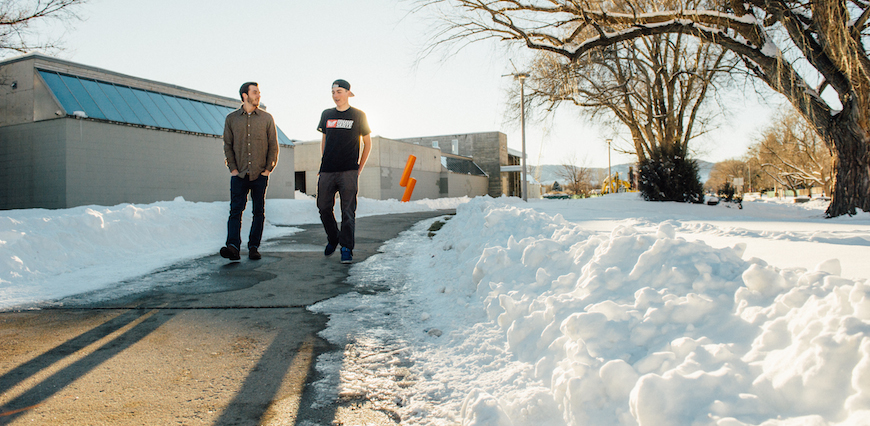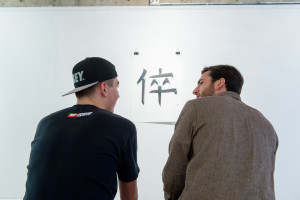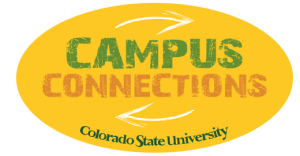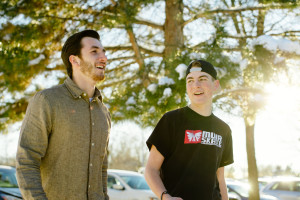
When Colin Harris was growing up, he struggled with anger management issues and running with the wrong crowd. He found a mentor in the drug and alcohol counselor at his high school, and Harris regularly stopped by his office to chat.
“When I talked to him, I didn’t feel like I was talking to faculty,” he recalls.
Last semester, the senior psychology major at Colorado State University got a chance to return the favor. He joined Campus Connections, formerly known as Campus Corps, and served as a mentor to Nick, a local 15-year-old who was going through similar struggles.
“Kids experiment, and I was one of those kids,” Harris says. “People judge you, and a mentor can break the pattern, get you out of that cycle. I was in a very similar place in my life when I was Nick’s age. It’s pretty cool to look back and be on the other side of the table.”

Nick says Harris and Campus Connections have made a big impact on his life.
“I had been messing up, doing stupid stuff, and my mom wanted to find me a mentorship program instead of a counselor,” he says. “I was struggling with being drawn to the wrong crowd. But through Campus Connections I felt like I had someone other than my parents to talk to. It was good to talk to someone like Colin who understands.”
And it seems the mentors benefit from the program as much as their mentees.
“I started looking at myself from a third perspective and being more aware of how I behave and what I say,” Harris says. “I don’t think I’m ever going to be the same again.”
CC’s roots
Campus Connections was born in 2009 as part of an effort to better serve high-risk and troubled youth in the community. Toni Zimmerman and Shelley Haddock, both faculty members in the Department of Human Development and Family Studies, launched it as Campus Corps with the help of a $500,000 grant from the Corporation for National and Community Service, and the first group of CSU student mentors was paired with mentees referred from the juvenile justice system in spring 2010. Since then, mentors have come from about 90 different majors on campus. More than 2,000 CSU students have been involved to date.
In the program, after the CSU mentors undergo a three-week training period, they are paired with youth between the ages of 11 and 18. Each duo meets once a week on campus from 4 to 8 p.m. During their meeting time, they take a walk on campus and share a dinner provided by the Food Bank of Larimer County. Mentors help mentees with their schoolwork and then organize games and other activities. The mentors are supported by past mentors who serve as coaches, as well as by graduate students in the Marriage and Family Therapy Program.
 Research has shown that Campus Connections has been highly effective for the mentees, resulting in lower recidivism, better school engagement, improved relationships, improved feelings of mattering and better psychological well-being. It’s also been shown that it has positive outcomes for the CSU students involved, in areas like community service, interpersonal skills, citizenship, personal responsibility, self-esteem and political awareness.
Research has shown that Campus Connections has been highly effective for the mentees, resulting in lower recidivism, better school engagement, improved relationships, improved feelings of mattering and better psychological well-being. It’s also been shown that it has positive outcomes for the CSU students involved, in areas like community service, interpersonal skills, citizenship, personal responsibility, self-esteem and political awareness.
Documented results
CSU’s Office of Institutional Research, Planning and Effectiveness has conducted two studies on Campus Connections, in 2012 and 2015. CSU student participation in Campus Connections is associated with 63 percent lower odds of dropping out of CSU in any given year. And participation is associated with 127 percent higher odds of graduating.
“We really do exemplify the land-grant mission of service, learning and research,” says Jen Krafchick, an assistant professor in the Department of Human Development and Family Studies and a co-director of Campus Connections. “We help make other mentoring programs more effective and identify what the best practices are in mentoring. It’s kind of like the gift that keeps on giving.”
CSU recently licensed the Campus Connections program and launched a pilot at the University of Northern Colorado in Greeley last semester. In addition, program leaders are working closely with two faculty members at the University of Auckland in New Zealand to launch the program there.
The initial grant supporting the program was not renewed after the first three years due to federal budget cuts, and now Campus Connections is funded by a variety of other grants — and donations.
“If we have a bad year for grants, the only way we can roll money over is through our development account, which is where our donations go,” Krafchick says. “It’s so difficult to plan for a rainy day.”
Contributions can be made online at advancing.colostate.edu/CampusConnections.

Measuring the impact
Krafchick says program leaders are launching a research effort this semester to collect data on the ongoing relationships and long-term effects among the mentors and mentees who have participated.
In the case of Harris and Nick, the lasting impact so far has been a friendship that has outlived the program, thanks to their mutual interests. The two have met on several occasions since the semester ended, including a visit to the climbing wall at CSU’s Student Recreation Center.
“The biggest thing I got out of Campus Connections was a friend,” Nick says. “Plus, I’ve always wanted to go to college, and this just reinforced that. You feel like you’re part of campus. The program is a safe place to be yourself. You don’t feel pressure to be anyone different.”
Before serving as a mentor, Harris didn’t think he wanted to become a therapist for adolescents. His Campus Connections experience made him decide that’s exactly what he wants to do in his career.
“If you’re there for someone, it pays off,” he says.
And Nick hopes to get the opportunity to pay it forward, like Harris did.
“Now I want to go back and help out too,” he says. “If I go to college anywhere that has a program like this, I’ll probably sign up, to give back. Everyone needs someone to be there for them.”
The Department of Human Development and Family Studies is in CSU’s College of Health and Human Sciences.
You can State Your Purpose by giving to Campus Connections.
